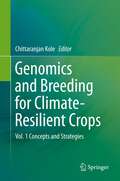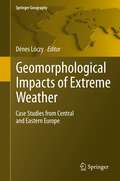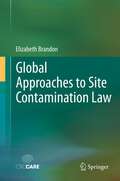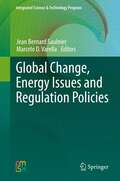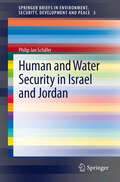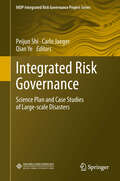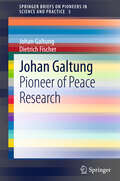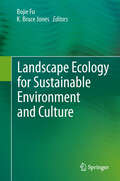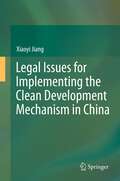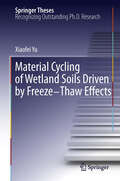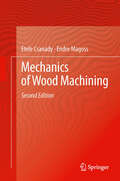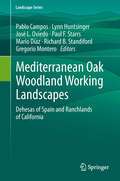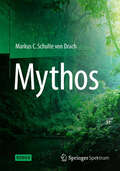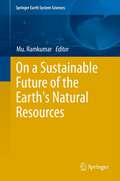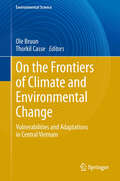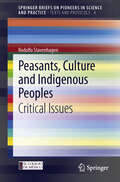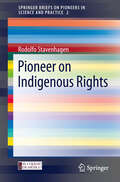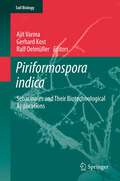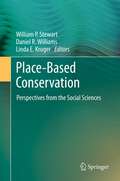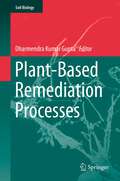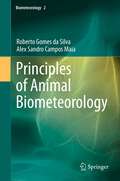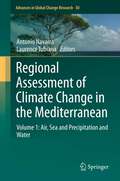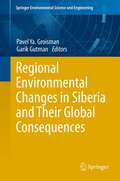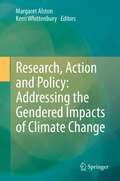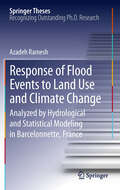- Table View
- List View
Genomics and Breeding for Climate-Resilient Crops
by Chittaranjan KoleClimate change is expected to have a drastic impact on agronomic conditions including temperature, precipitation, soil nutrients, and the incidence of disease pests, to name a few. To face this looming threat, significant progress in developing new breeding strategies has been made over the last few decades. The first volume of Genomics and Breeding for Climate-Resilient Crops presents the basic concepts and strategies for developing climate-resilient crop varieties. Topics covered include: conservation, evaluation and utilization of biodiversity; identification of traits, genes and crops of the future; genomic and molecular tools; genetic engineering; participatory and evolutionary breeding; bioinformatics tools to support breeding; funding and networking support; and intellectual property, regulatory issues, social and political dimensions.
Geomorphological impacts of extreme weather
by Denes LoczyThis book presents new research on the geomorphological impacts of extreme precipitation events. It focuses on the extreme summer floods, which affected Central and Eastern Europe in 2010. Case studies on their consequences, including inundations, urban flooding, soil erosion, river bank retreat, alluvial fan accumulation, evolution of karst depressions, debris flows, landslides and soil saturation are presented for Poland, the Czech Republic, Ukraine, Slovakia, Hungary, Romania, Slovenia, Croatia, Serbia, Bulgaria and Macedonia. This key applied geomorphology book is crucial for anyone interested in these processes and their consequences and also for decision makers who face these catastrophes.
Global Approaches to Site Contamination Law
by Elizabeth BrandonThe book describes the complex and variable laws addressing site contamination, reviewing existing international, regional and national law of relevance to site contamination. It also offers detailed case studies of national approaches to the issue, and goes on to explore avenues for promoting the development of comprehensive domestic laws on site contamination, with a focus on the role of international law and actors. A detailed discussion analyzes such variations as a binding international legal instrument, a non-binding instrument, and a model framework for site contamination management. The text includes recommendations regarding the key elements needed for regulating site contamination at the national level. The author also offers an appropriate and feasible timetable for international action to promote better national law and policy regarding contaminated sites.
Global Change, Energy Issues and Regulation Policies
by Marcelo D. Varella Jean Bernard SaulnierThis book analyses the deep interaction between the world's environmental crises, energy production, conversion and use, and global regulation policies. Bringing together experts from a wide range of scientific fields, it offers the reader a broad scope of knowledge on such topics as: climate change and exhaustion of resources the relationship between basic science and the development of sustainable energy technologies the relationship between global and local environmental policiesthe possible competition between foodstuff production and that of agro-fuels urban adaptation negotiations at the international level financial rules This book invites the reader to consider the multidisciplinary aspects of these urgent energy/environmental issues.
Human and Water Security in Israel and Jordan
by Philip Jan SchäferThe work aims at answering the question as to how far discourses on human security are present in Jordan and Israel, if they converge and if political solutions for the issue of water security could be derived. The analysis is based on the assumption that from human security perspective common solutions for urgent problems can be derived more easily than out of a perspective of national security. Yet it is acknowledged that according to a new security perspective different security threats are being identified by relevant actors. An empirical analysis of written statements and utterances of the respective security elites establishes the methodological tool for the identification of human security discourses in Israel and Jordan. Subsequently it is estimated how far water is presented as a matter of national security in Israel and Jordan using the theory of securitization.
Integrated Risk Governance
by Qian Ye Peijun Shi Carlo Jaeger"Integrated Risk Governance: Science Plan and Case Studies of Large-scale Disasters" is the first book in the IHDP-Integrated Risk Governance Project Series. It consists of two parts: Part I: Integrated Risk Governance Project Science Plan, which outlines the challenge, research programme, outcomes, and implementation strategy of the IRG Project; and Part II: Case Studies of Large-scale Disasters, which includes case analyses of experience, lessons learned and recommendations on various large-scale disasters around the world, such as the Tangshan and Wenchuan earthquakes and the great ice storm in China, European heat waves, and Hurricane Katrina in the USA. The community model of integrated natural disaster risk governance and paradigm of catastrophe risk governance in China are also presented. Prof. Peijun Shi works at Beijing Normal University, China; Prof. Carlo Jaeger works at Potsdam Institute for Climate Impact Research, Germany; Prof.Qian Ye works at Beijing Normal University, China.
Johan Galtung
by Dietrich Fischer Johan GaltungThis is the first ever anthology of key articles by Johan Galtung, widely regarded as the founder of the academic discipline of peace studies. It covers such concepts as direct, structural and cultural violence; theories of conflict, development, civilization and peace; peaceful conflict transformation; peace education; mediation; reconciliation; a life-sustaining economy; macro-history; deep culture and deep structure; and social science methodology. Galtung has contributed original research, concepts and theories to more than 20 social science disciplines, including sociology, international relations and future studies, and has also applied his new insights in practice. The book is a valuable resource for researchers and practitioners, and can serve as a supplemental textbook for graduate and upper undergraduate courses in peace studies and related fields.
Landscape Ecology for Sustainable Environment and Culture
by Bojie Fu Bruce Jones KClimate change and the pressures of escalating human demands on the environment have had increasing impacts on landscapes across the world. In this book, world-class scholars discuss current and pressing issues regarding the landscape, landscape ecology, social and economic development, and adaptive management. Topics include the interaction between landscapes and ecological processes, landscape modeling, the application of landscape ecology in understanding cultural landscapes, biodiversity, climate change, landscape services, landscape planning, and adaptive management to provide a comprehensive view that allows readers to form their own opinions. Professor Bojie Fu is an Academician of Chinese Academy of Sciences and Chair of scientific committee at the Research Center for Eco-Environmental Sciences, Chinese Academy of Sciences, Beijing, China. Professor K. Bruce Jones is the Executive Director for Earth and Ecosystem Sciences Division at Desert Research Institute, University of Nevada, Las Vegas, USA.
Legal Issues for Implementing the Clean Development Mechanism in China
by Xiaoyi JiangToday, climate change is among the most hotly-debated topics. The Clean Development Mechanism (CDM), one of the three financial mechanisms under the Kyoto Protocol open to developing and developed countries, was devised to assist in mitigation of global warming. This book discusses what China should do to make full use of the CDM to promote sustainable development and to meet the challenge of climate change from a legal perspective. The findings lead to the conclusion that the CDM has limitations in promoting sustainable development in China, and thus should be regarded only as a complementary instrument in combating climate change. Legal strategies for improving the implementation of CDM projects under the legal framework in China are thus put forward, and some proposals for China to meet the challenge of climate change in the post-2012 era are made. This book offers new insights to academics and policymakers both in the public and private sector. It is intended for legal practitioners and researchers on carbon trading as well as policymakers interested in the role of developing countries in climate change law. In addition, it is of interest to stakeholders of CDM projects.
Material Cycling of Wetland Soils Driven by Freeze-Thaw Effects
by Xiaofei YuFreezing and thawing of soils is a common phenomenon in the winter-cold zone. The thesis titled "Material Cycling of Wetland Soils Driven by Freeze-Thaw Effects" systematically explores the freeze-thaw effects on the accumulation and release processes of carbon and nitrogen in wetland soils, which is a good step toward the investigation of biogeochemical processes in wetlands in seasonal freeze-thaw areas. It is also developing strategies aimed at global warming effects on the accumulation and release of carbon and nitrogen in wetlands. Dr. Xiaofei Yu works at the Northeast Institute of Geography and Agroecology, Chinese Academy of Sciences, China.
Mechanics of Wood Machining
by Endre Magoss Etele CsanádyWood is one of the most valuable materials for mankind, and since our earliest days wood materials have been widely used. Today we have modern woodworking machine and tools; however, the raw wood materials available are continuously declining. Therefore we are forced to use this precious material more economically, reducing waste wherever possible. This new textbook on the "Mechanics of Wood Machining" combines the quantitative, mathematical analysis of the mechanisms of wood processing with practical recommendations and solutions. Bringing together materials from many sources, the book contains new theoretical and experimental approaches and offers a clear and systematic overview of the theory of wood cutting, thermal loading in wood-cutting tools, dynamic behaviour of tool and work piece, optimum choice of operational parameters and energy consumption, the wear process of the tools, and the general regularities of wood surface roughness. Diagrams are provided for the quick estimation of various process parameters. This book will be useful for scientists, graduate and postgraduate students, and practising engineers seeking a deeper understanding of physical phenomena associated with real woodworking processes.
Mediterranean Oak Woodland Working Landscapes
by Gregorio Montero Jose Luis Oviedo Pro Lynn Huntsinger Mario Diaz Pablo Campos Paul F Starrs Richard B StandifordThe oak tree was a boon companion as humans expanded their presence across much of the globe. While oak woodlands (Quercus spp.) come today in stunningly diverse forms, the stately dehesas of Spain and the dramatic oak-dominated ranchlands of California are working landscapes where cultivation and manipulation for a couple of millennia have shaped Mediterranean-type ecosystems into a profoundly modified yet productive environment that is sought-after by every manner of species. The grazing of wildlife and livestock in oak woodlands yields a remarkable plant and animal biodiversity, creating a mosaic of habitats and visually pleasing savannas. Added products unique to Spain such as Iberian pigs and cork, and in California multiple landowner benefits, include valued ecosystem services that allow owners, visitors, and conservation supporters to experience the benefits of woodland life. With its 15 chapters a decade in the making, this handsomely illustrated book covers key topics in oak woodland policy, ecology, and management in Spain and California, presenting new research results and reviewing an existing expert literature.
Mythos
by Markus C Schulte von DrachEine Expedition ins Herz des Dschungels. Eine Reise an den Anfang und das Ende des Glaubens. Eine abenteuerliche Auseinandersetzung mit der Religion und der Evolution. Im Jahr 1539 begegnet der spanische Konquistador Juan de la Torre im Amazonasdschungel dem Teufel. Als fast 500 Jahre später die deutsche Schriftkundlerin Nora Tilly im Indienarchiv von Sevilla auf Dokumente des Spaniers stößt, entdeckt sie Hinweise auf einen Inka-Schatz. Doch bald muss sie feststellen, dass sie nicht die einzige ist, die sich auf den Weg macht, um das Gold zu finden. Die irische Journalistin Brea MacLoughlin reist mit einer Delegation katholischer Geistlicher ebenfalls nach Peru, um ein angebliches Wunder in den Anden zu überprüfen. Zu dieser Delegation gehört auch der junge Priester Arnaud d'Albret, der in Südamerika über eine ihm verbotene Liebe hinwegzukommen hofft. Nach dem gewaltsamen Tod seines Mentors schließt d'Albret sich Nora Tilly an. Auch Brea MacLoughlin folgt der Expedition der Schatzsucher. Im Dschungel Perus entdeckt unterdessen der Biologiestudent Francisco Pérez etwas, das eigentlich nicht existieren dürfte: das fünfzehn Millionen Jahre alte Fossil eines Riesenkrokodils, in dessen Schädel eine Pfeilspitze steckt. Der Versuch, dieses Rätsel zu lösen, führt ihn schließlich mit den Schatzjägern aus Europa zusammen. Doch was die Expedition im Dschungel erwartet, ist nicht nur das Gold der Inka. Tief im Wald stoßen sie auf etwas, das ihr Weltbild in Stücke reißt. ......... "Eine abenteuerliche Melange aus Dawkins' Gotteswahn, Indiana Jones und Jurassic Park. Schulte von Drach gelingt, was Dan Brown nie schaffte: den Leser zu fesseln, ohne seinen Verstand zu lähmen. Absolut empfehlenswert!" Michael Schmidt-Salomon, Philosoph und Schriftsteller, Vorstandssprecher der Giordano-Bruno-Stiftung, Autor von "Jenseits von Gut und Böse" "Wie viel Menschenwerk steckt in der Religion? Im Unterschied zum ätzenden Stil neoatheistischer Gotteswahn-Polemik setzt dieses Buch auf eine Strategie à la Umberto Eco: Der Reigen religionskritischer Überlegungen ist eingepackt in eine Rahmenhandlung, deren Spannung - Science-Fiction und Thriller im besten Sinn - den Leser mitnimmt zu den Etappen der intellektuellen Auseinandersetzung." Christian Kummer, Biologe, Philosoph und Jesuit, Professor an der Hochschule für Philosophie in München, Autor von "Der Fall Darwin" _____ Terra X und Theodizee, Evolution und El Dorado, Schatzjagd und Gottessuche - Markus C. Schulte von Drachs neuer Roman entführt Sie auf eine abenteuerliche Reise um die halbe Welt und zurück bis ins 16. Jahrhundert: Von Sevilla, Kismayoo, Florida und Iquitos aus machen sich seine Helden auf den Weg ins Herz des Amazonas-Regenwaldes. Auf der Suche nach dem legendären Inka-Gold, einem unglaublichen Fossil und ihrem Seelenfrieden stoßen ein französischer Priester, eine deutsche Schatzjägerin, eine irische Journalistin, ein peruanischer Biologiestudent und ein türkischer Kreationist auf die Spuren des Matararo. Doch gibt es dieses Wesen überhaupt? Lassen Sie sich von den Abenteuern genauso fesseln wie von den Auseinandersetzungen über Religion und Wissenschaft, die diesen Thriller so außergewöhnlich machen. Folgen Sie den unterschiedlichen Persönlichkeiten auf ihrem Weg, bis am Ende alle gemeinsam vor einer einzigen Aufgabe stehen: zu überleben.
On a Sustainable Future of the Earth's Natural Resources
by Mu. RamkumarOn a Sustainable Future of the Earth's Natural Resources is divided into three sections, with individual chapters contributed by experts on diff erent facets of the earth sciences, natural resources management and related issues. The first section focuses on the status of Earth's resources; land, water, biota and atmosphere. Reviews on the rate of exploitation and the need to conserve these resources for future sustenance are also covered in this section. Th e following section includes chapters elucidating environmental, ecological, climatological and anthropological pressures on sustained nourishment with the Earth's resources. The last section describes management practices, issues and perspectives on sociological, legal, administrative, ICT and strategic efforts that need to be implemented in order to sustain our natural resources. This book covers a broad spectrum of the Earth's resources and sustenance, offering a comprehensive perspective on their past, present and future.
On the Frontiers of Climate and Environmental Change
by Ole Bruun Thorkil CasseThis book is intended to fill a gap in climate-change literature by providing a comprehensive regional study and identifying the overall adaptation challenges in a real-life context. The way in which possible climate impacts interact with a range of other challenges in agriculture, forestry, disaster planning, health care, general economic development, and common livelihoods are presented, and it is argued that greater realism and broader vision are needed in order to address the climate challenge. For instance, unsuitable land- use changes in both coastal and highland regions may increase the vulnerability of rural people, many of whom are already living on the fringes. The author(s) also state(s) that, depending on context, it may be pertinent to address short-term and unsustainable resource use, irregularities in local land management, ineffective governance and social inequality, which are all likely to aggravate the impact of external climate and weather. Not least, it is imperative to integrate general environmental management with any climate-change adaptation effort.
Peasants, Culture and Indigenous Peoples
by Rodolfo StavenhagenThis last volume in a trilogy published on the occasion of the 80th birthday of Rodolfo Stavenhagen, professor emeritus of El Colegio de Mexico, includes eight essays on Peasants, Culture and Indigenous Peoples: Critical Issues; Basic Needs, Peasants and the Strategy for Rural Development (1976); Cultural Rights: a Social Science Perspective (1998); The Structure of Injustice: Poverty, Marginality, Exclusion and Human Rights (2000); What Kind of Yarn? From Color Line to Multicolored Hammock: Reflections on Racism and Public Policy (2001); The United Nations Special Rapporteur on the Rights of Indigenous Peoples (2012); A Report on the Human Rights Situation of Indigenous Peoples in Asia (2007); Report on the Impact of Megaprojects on the Rights of Indigenous Peoples (2003); and Study Regarding the Best Practices to Implement the Recommendations of the Special Rapporteur (2007). These texts address human rights issues, especially those that arose when Stavenhagen was servinged as United Nations special rapporteur on the rights of indigenous peoples.
Pioneer on Indigenous Rights
by Rodolfo StavenhagenOn the occasion of the 80th birthday of Rodolfo Stavenhagen, a distinguished Mexican sociologist and professor emeritus of El Colegio de Mexico, Úrsula Oswald Spring (UNAM/CRIM, Mexico) introduces him as a Pioneer on Indigenous Rights due to his research on human rights issues, especially when he served as United Nations Special Rapporteur on the rights of indigenous peoples. First, in a retrospective Stavenhagen reviews his scientific and political work for the rights of indigenous peoples. Seven of his classic texts address Seven Fallacies about Latin America (1965); Decolonializing Applied Social Sciences (1971); Ethnodevelopment: A Neglected Dimension in Development Thinking (1986); Human Rights and Wrongs: A Place for Anthropologists? (1998); Indigenous Peoples and the State in Latin America: An Ongoing Debate (2000); Building Intercultural Citizenship through Education: A Human Rights Approach (2006); and Making the Declaration Work (2006). This volume discusses the emergence of indigenous peoples as new social and political actors at the national level in numerous countries, as well as on the international scene. This book introduces a trilogy of Briefs on Rodolfo Stavenhagen published in the same series Pioneers in Science and Practice.
Piriformospora indica
by Ajit Varma Gerhard Kost Ralf OelmüllerSebacinales have emerged as a fascinating order with mutualistic plant-fungal symbionts that consists of exclusively beneficial fungi. This volume of Soil Biology presents an overview of the current results in Sebacinales research with a focus on the potential of these fungi in crop improvement and stress tolerance. The authors demonstrate that Sebacinales are not only extremely versatile in their associations with roots, but are also almost universally present as symptomless endophytes. With this extraordinary diversity, Sebacinales with the key fungus Piriformospora indica might possess remarkable significance in natural ecosystems. Their biotechnological applications are expected to improve the quality of crops while maintaining ecologically and economically sustainable production systems.
Place-Based Conservation
by Linda E. Kruger Suzette Dailey William P. StewartThe concept of "Place" has become prominent in natural resource management, as professionals increasingly recognize the importance of scale, place-specific meanings, local knowledge, and social-ecological dynamics. Place-Based Conservation: Perspectives from the Social Sciences offers a thorough examination of the topic, dividing its exploration into four broad areas. Place-Based Conservation provides a comprehensive resource for researchers and practitioners to help build the conceptual grounding necessary to understand and to effectively practice place-based conservation.
Plant-Based Remediation Processes
by Dharmendra Kumar GuptaPhytoremediation is an emerging technology that employs higher plants for the clean-up of contaminated environments. Basic and applied research have unequivocally demonstrated that selected plant species possess the genetic potential to accumulate, degrade, metabolize and immobilize a wide range of contaminants. The main focus of this volume is on the recent advances of technologies using green plants for remediation of various metals and metalloids. Topics include biomonitoring of heavy metal pollution, amendments of higher uptake of toxic metals, transport of heavy metals in plants, and toxicity mechanisms. Further chapters discuss agro-technological methods for minimizing pollution while improving soil quality, transgenic approaches to heavy metal remediation and present protocols for metal remediation via in vitro root cultures.
Principles of Animal Biometeorology
by Roberto Gomes da Silva Alex Sandro Campos MaiaThe book begins by describing in detail the mechanisms of energy exchange - radiative, convective, conductive and evaporative - together with techniques for their determination. The discussion extends to the importance of CO2, ozone and methane, together with that of aerosol pollutants and the evolution of atmospheric CO2. Subsequent chapters apply the results of the biophysical methods to mammals, birds and aquatic animals. Discussion includes problems of shelter and shade for animals in tropical environments and techniques for the thermal evaluation for shelters and for several tree types. The details of heat exchange between animals and the environment are presented, in separate chapters covering Mammals and Birds and Aquatic Mammals. A chapter on Shade and Shelter describes the importance of shade for animals, factors of shade efficiency, the protections offered by shelter and methods of calculating the protection afforded by both shade and shelter. A Special Methods chapter offers a variety of techniques for evaluating cutaneous and respiratory evaporation, and practical methods for sampling of hairs and the evaluation of hair coat characteristics.
Regional Assessment of Climate Change in the Mediterranean
by Antonio Navarra Laurence TubianaThis is the third volume of a three-volume final report, which thoroughly describes, synthesizes and analyzes the results of the four-year Integrated Research Project CIRCE - Climate Change and Impact Research: Mediterranean Environment, funded by the EU 6th Framework Programme. Conducted under the auspices of the National Institute of Geophysics and Volcanology in Rome, Italy, the study was designed to predict and to quantify the physical impacts of climate change in the Mediterranean, and to assess the most influential consequences for the population of the region.
Regional Environmental Changes in Siberia and Their Global Consequences
by Garik Gutman Pavel Ya. GroismanThis volume presents a state-of-the-art assessment of the Earth's climate system in Siberia and relationships between climate, ecosystems and people in that region. Changes in climatic variables and land cover in Siberia are among the earliest indicators of the Earth's response to climate warming. The volume is a compilation of results from studies on climate, land-cover and land-use changes and their interactions with biogeochemical and water cycles, atmospheric aerosol, and human and wildlife populations in Siberia. Regional changes in Siberia are predicted to affect climate and people on a global scale. NASA, the Russian Academy of Sciences, and several European institutions have supported these studies. The primary supporter of the projects that produced the results compiled in this volume is the NASA Land-Cover/Land-Use Change Program, hence most studies use remote sensing in their research. The chapters in this volume were written by an international team of scientists from the USA, Europe and Russia under the auspices of the Northern Eurasia Earth Science Partnership Initiative (NEESPI). This book will be of interest to those involved in studying recent and ongoing changes in Siberia, be they senior scientists, early career scientists or students.
Research, Action and Policy: Addressing the Gendered Impacts of Climate Change
by Kerri Whittenbury Margaret AlstonResearch, Action and Policy: Addressing the Gendered Impacts of Climate Change presents the voices of women from every continent, women who face vastly different climate events and challenges. The book heralds a new way of understanding climate change that incorporates gender justice and human rights for all.
Response of Flood Events to Land Use and Climate Change
by Azadeh RameshThis book is an original and novel contribution to flood hazard assessment, climate change and land use change and is intended to serve both as an effective source of information and a valuable basis for priority setting and further technical, financial and political decisions regarding flood hazard assessment. The study area is located on the floodplain of the Ubaye River in the Barcelonnette area, part of the Alpes de Haute Provence in southeast France. The book offers a comparative overview of the major challenges faced when dealing with flood hazards. The research presented is intended to promote a deeper understanding of how climate change and land use change processes have evolved from past to present, and how they affect the flow regime of the Ubaye River based on sound and reproducible scientific arguments. The methodology implemented ranges from remote sensing interpretation to hydrodynamic modeling and includes the application of spatial and statistical modeling. The results of this research provide essential information for policymaking, decision-making support and flood hazard planning in the Barcelonnette area.
